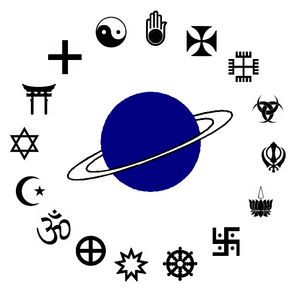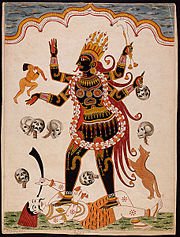
Religion in speculative fiction
Encyclopedia

Religion
Religion is a collection of cultural systems, belief systems, and worldviews that establishes symbols that relate humanity to spirituality and, sometimes, to moral values. Many religions have narratives, symbols, traditions and sacred histories that are intended to give meaning to life or to...
is a commonly tackled topic in the speculative fiction
Speculative fiction
Speculative fiction is an umbrella term encompassing the more fantastical fiction genres, specifically science fiction, fantasy, horror, supernatural fiction, superhero fiction, utopian and dystopian fiction, apocalyptic and post-apocalyptic fiction, and alternate history in literature as well as...
genres of science fiction
Science fiction
Science fiction is a genre of fiction dealing with imaginary but more or less plausible content such as future settings, futuristic science and technology, space travel, aliens, and paranormal abilities...
, fantasy
Fantasy
Fantasy is a genre of fiction that commonly uses magic and other supernatural phenomena as a primary element of plot, theme, or setting. Many works within the genre take place in imaginary worlds where magic is common...
, horror
Horror fiction
Horror fiction also Horror fantasy is a philosophy of literature, which is intended to, or has the capacity to frighten its readers, inducing feelings of horror and terror. It creates an eerie atmosphere. Horror can be either supernatural or non-supernatural...
and others. Proto-speculative fiction texts have strong similarities to mythological
Mythology
The term mythology can refer either to the study of myths, or to a body or collection of myths. As examples, comparative mythology is the study of connections between myths from different cultures, whereas Greek mythology is the body of myths from ancient Greece...
or religious texts.
Science fiction often incorporates transcendental or mystical themes, investigating questions usually associated with theology
Theology
Theology is the systematic and rational study of religion and its influences and of the nature of religious truths, or the learned profession acquired by completing specialized training in religious studies, usually at a university or school of divinity or seminary.-Definition:Augustine of Hippo...
or metaphysics
Metaphysics
Metaphysics is a branch of philosophy concerned with explaining the fundamental nature of being and the world, although the term is not easily defined. Traditionally, metaphysics attempts to answer two basic questions in the broadest possible terms:...
. Transreal mono-
Monotheism
Monotheism is the belief in the existence of one and only one god. Monotheism is characteristic of the Baha'i Faith, Christianity, Druzism, Hinduism, Islam, Judaism, Samaritanism, Sikhism and Zoroastrianism.While they profess the existence of only one deity, monotheistic religions may still...
and poly-theistic
Polytheism
Polytheism is the belief of multiple deities also usually assembled into a pantheon of gods and goddesses, along with their own mythologies and rituals....
religions are a common feature in fantasy, particularly epic and heroic fantasy
Heroic fantasy
Heroic fantasy is a sub-genre of fantasy which chronicles the tales of heroes in imaginary lands. Unlike stories of sword and sorcery, heroic fantasy narratives tend to be intricate in plot, often involving many peoples, nations and lands. Grand battles and the fate of the world are common themes,...
. Monotheistic religion are often portrayed as corrupt. Christian science fiction
Christian science fiction
Christian science fiction is a subgenre of both Christian literature and science fiction, in which there are strong Christian themes, or which are written from a Christian point of view. These themes may be subtle, expressed by way of analogy, or more explicit. Major influences include early...
and fantasy also exists, often written as allegory
Allegory
Allegory is a demonstrative form of representation explaining meaning other than the words that are spoken. Allegory communicates its message by means of symbolic figures, actions or symbolic representation...
for inspirational or propaganda
Propaganda
Propaganda is a form of communication that is aimed at influencing the attitude of a community toward some cause or position so as to benefit oneself or one's group....
purposes.
In contrast, Orson Scott Card
Orson Scott Card
Orson Scott Card is an American author, critic, public speaker, essayist, columnist, and political activist. He writes in several genres, but is primarily known for his science fiction. His novel Ender's Game and its sequel Speaker for the Dead both won Hugo and Nebula Awards, making Card the...
has stated that most fiction, including speculative fiction, is anti- or a-religious, in which religious people are depicted as "ignorant and stupid and easily fooled" followers or "exploitative and cynical" leaders.
Fictional religions

Earthseed
Earthseed is a fictional religion based on the idea that "God is Change." It is the creation of Octavia E. Butler, as revealed by her character Lauren Oya Olamina in the books: Parable of the Sower and Parable of the Talents...
religion in Octavia Butler's Parable of the Sower
Parable of the Sower
The Parable of the Sower is one of the parables of Jesus found in three out of the four Canonical gospels and in the non-canonical Gospel of Thomas In this story, a sower dropped seed on the path, on rocky ground, and among thorns, and the seed was lost; but when seed fell on good earth, it...
, or in the far future as seen in Dune
Dune (novel)
Dune is a science fiction novel written by Frank Herbert, published in 1965. It won the Hugo Award in 1966, and the inaugural Nebula Award for Best Novel...
by Frank Herbert
Frank Herbert
Franklin Patrick Herbert, Jr. was a critically acclaimed and commercially successful American science fiction author. Although a short story author, he is best known for his novels, most notably Dune and its five sequels...
with its Orange Catholic Bible
Orange Catholic Bible
The Orange Catholic Bible is a fictional book from the Dune universe created by Frank Herbert...
, the text of a syncretic blend of current religions.
The animated science fiction television series Futurama
Futurama
Futurama is an American animated science fiction sitcom created by Matt Groening and developed by Groening and David X. Cohen for the Fox Broadcasting Company. The series follows the adventures of a late 20th-century New York City pizza delivery boy, Philip J...
features a satirical religion for robots called Robotology
Robotology
The animated science fiction television program Futurama makes a number of satirical and humorous references to religion, including inventing several fictional religions which are explored in certain episodes of the series.- Robotology :...
amongst its treatment of multiple religions.
Christianity
Numerous works have explored Christian faith. Notable examples include the award winning A Case of ConscienceA Case of Conscience
A Case of Conscience is a science fiction novel by James Blish, first published in 1958. It is the story of a Jesuit who investigates an alien race that has no religion; they are completely without any concept of God, an afterlife, or the idea of sin; and the species evolves through several forms...
by James Blish
James Blish
James Benjamin Blish was an American author of fantasy and science fiction. Blish also wrote literary criticism of science fiction using the pen-name William Atheling, Jr.-Biography:...
and The Sparrow by Mary Doria Russell
Mary Doria Russell
Mary Doria Russell is an American novelist. -Biography:Russell was born in the suburbs of Chicago. Her parents were both in the military: her father was a Marine Corps drill instructor, and her mother was a Navy nurse. She graduated from Glenbard East High School and later she earned a Ph.D in...
, in which Jesuit missionaries seek to spread Christianity to newly discovered alien worlds. The classic Canticle for Leibowitz explores a world in which Catholicism
Catholicism
Catholicism is a broad term for the body of the Catholic faith, its theologies and doctrines, its liturgical, ethical, spiritual, and behavioral characteristics, as well as a religious people as a whole....
is one of the few institutions to survive an apocalypse, and its slow re-achievement of prominence as civilisation returns.
Christian science fiction
Christian science fiction
Christian science fiction is a subgenre of both Christian literature and science fiction, in which there are strong Christian themes, or which are written from a Christian point of view. These themes may be subtle, expressed by way of analogy, or more explicit. Major influences include early...
and fantasy also exists, often written as allegory
Allegory
Allegory is a demonstrative form of representation explaining meaning other than the words that are spoken. Allegory communicates its message by means of symbolic figures, actions or symbolic representation...
for inspirational or propaganda
Propaganda
Propaganda is a form of communication that is aimed at influencing the attitude of a community toward some cause or position so as to benefit oneself or one's group....
purposes. A Christian theme may be subtle, expressed by way of analogy, or more explicit.
Hinduism

See also
- List of religious ideas in science fiction
- List of fictional religions
- List of Catholic Science Fiction and Fantasy authors
- List of Protestant Science Fiction and Fantasy authors
External links
- Religious Science Fiction Books and Links at www.adherents.com

